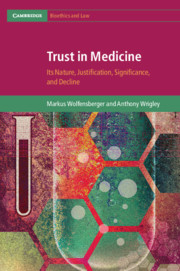Book contents
- Trust in Medicine
- Cambridge Bioethics and Law
- Trust in Medicine
- Copyright page
- Dedication
- Contents
- Figures
- Tables
- Preface
- Acknowledgements
- A Note on Usage
- Part I Introduction
- Part II The Nature of Trust
- Part III Justification of Trust
- Part IV Significance of Trust
- 10 Instrumental Utility of Trust
- 11 The Moral Value of Trust
- Part V The Decline of Trust
- Part VI Perspectives
- References
- Index
- Series page
11 - The Moral Value of Trust
from Part IV - Significance of Trust
Published online by Cambridge University Press: 19 August 2019
- Trust in Medicine
- Cambridge Bioethics and Law
- Trust in Medicine
- Copyright page
- Dedication
- Contents
- Figures
- Tables
- Preface
- Acknowledgements
- A Note on Usage
- Part I Introduction
- Part II The Nature of Trust
- Part III Justification of Trust
- Part IV Significance of Trust
- 10 Instrumental Utility of Trust
- 11 The Moral Value of Trust
- Part V The Decline of Trust
- Part VI Perspectives
- References
- Index
- Series page
Summary
Whereas most people agree that trust has an instrumental value, there is a considerable debate about whether trust is a moral notion and hence is of moral significance. To defend their position that trust is morally significant, the authors present two arguments: (1) a breach of trust typically leads to a feeling of betrayal, a reactive attitude, which is only warranted in cases pertaining to morality, and (2) the belief in a moral obligation of the trustee can be justified by the concept of obligation-ascription.
- Type
- Chapter
- Information
- Trust in MedicineIts Nature, Justification, Significance, and Decline, pp. 162 - 170Publisher: Cambridge University PressPrint publication year: 2019
- 1
- Cited by

